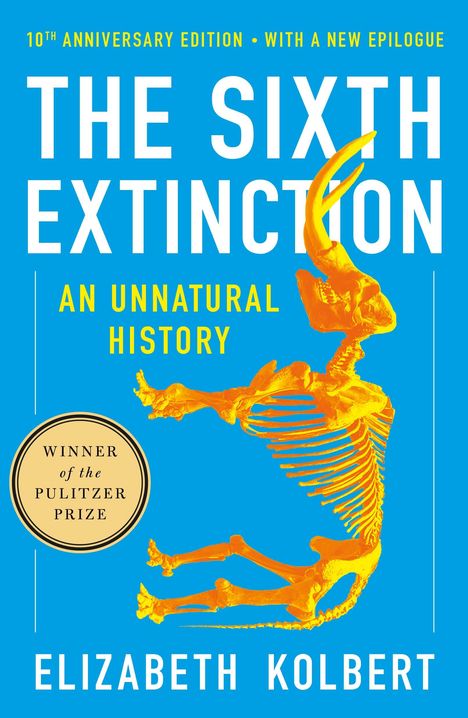Elizabeth Kolbert: Sixth Extinction (10th Anniversary Edition), Kartoniert / Broschiert
Sixth Extinction (10th Anniversary Edition)
(soweit verfügbar beim Lieferanten)
- Verlag:
- St. Martins Press, 04/2024
- Einband:
- Kartoniert / Broschiert
- Sprache:
- Englisch
- ISBN-13:
- 9781250887313
- Artikelnummer:
- 11491870
- Umfang:
- 354 Seiten
- Gewicht:
- 454 g
- Maße:
- 210 x 137 mm
- Stärke:
- 25 mm
- Erscheinungstermin:
- 16.4.2024
- Serie:
- Holt Paperbacks
- Hinweis
-
Achtung: Artikel ist nicht in deutscher Sprache!
Weitere Ausgaben von Sixth Extinction |
Preis |
|---|
Klappentext
WINNER OF THE PULITZER PRIZE ONE OF THE NEW YORK TIMES BOOK REVIEW 'S 10 BEST BOOKS OF THE YEAR A NEW YORK TIMES BESTSELLER A NATIONAL BOOK CRITICS CIRCLE AWARD FINALIST
The 10th-anniversary edition of the instant classic,The Sixth Extinction, now with a new epilogue. Kolbert blends intellectual and natural history and field reporting into a powerful account of the mass extinction unfolding before our eyes.
Over the last half a billion years, there have been five mass extinctions, when the diversity of life on earth suddenly and dramatically contracted. Scientists around the world are currently monitoring the Sixth Extinction, predicted to be the most devastating extinction event since the asteroid impact that wiped out the dinosaurs. This time around, the cataclysm is us.
In The Sixth Extinction , two-time winner of the National Magazine Award and New Yorker writer Elizabeth Kolbert draws on the work of scores of researchers in half a dozen disciplines, accompanying many of them into the field: geologists who study deep ocean cores, botanists who follow the tree line as it climbs up the Andes, marine biologists who dive off the Great Barrier Reef. She introduces us to a dozen species, some already gone, others facing extinction, including the Panamian golden frog, staghorn coral, the great auk, and the Sumatran rhino. Through these stories, Kolbert provides a moving account of the disappearances occurring all around us and traces the evolution of extinction as concept, from its first articulation by Georges Cuvier in revolutionary Paris up through the present day. In the ten years since the book was originally published, evidence of the Sixth Extinction has continued to mount, making its message more urgent than ever.
The Sixth Extinction is likely to be mankind's most lasting legacy; as Kolbert observes, it compels us to rethink the fundamental question of what it means to be human.
Biografie
Elizabeth Kolbert war lange Journalistin für die New York Times und arbeitet heute als Reporterin für das Magazin The New Yorker, wo sie die Ressorts Politik und Ökologie betreut. Sie lebt in Williamstown, Massachusetts.Mehr von Elizabeth Kolbert



